Applications
Thermal imaging is a non invasive test of physiology that is a key tool in the early identification of musculoskeletal and neurologic injuries. It is especially helpful with non specific and difficult to diagnose lameness.
LAMENESS ASSESSMENT
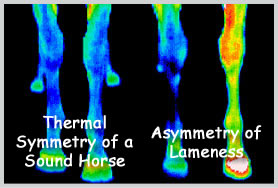
Lameness that is difficult to diagnose and treat creates both an emotional and financial strain. Digital Infrared Thermal Imaging is globally recognized as a key tool in the early identification of musculoskeletal and neurological injuries, especially non-specific and intermittent lameness. Accurate and early diagnosis while injuries or diseases that are still in the sub-clinical stage allows for better treatment options and a better recovery. Treating an injury or disease in the earliest stages is far simpler and more economic than dealing with a chronic issue or advanced stage disease.
EquiSpectrum DITI can detect the early stages of pedal osteitis, navicular disease, hoof abcesses & laminitis. These conditions, along with synovitis of the joints and tendon sheaths, periosteal damage are easily demonstrated. Clinical research has proven that DITI can detect tendon lesions two weeks before they are clinically evident.
DITI has excellent correlation with other diagnostic tools and can assist in helping radiographs locate chip fractures and difficult to image stress factures that may otherwise have only been detected with nuclear scintigraphy.
The sensitivity and specificity of EquiSpectrum DITI is also successful in detecting vasculitis, limb ischemia, DVT and nerve damage or entrapment; unsoundesses not attributed to a structural abnormality.
EquiSpectrum DITI can also be used to define the extent of a lesion that has been previously diagnosed by your veterinarian, or to localize an abnormal area not previously identified so that further diagnostic testing may be performed.
EquiSpectrum DITI has proven to be valuable resource for farriers and their clients. Thermography can demostrate the distribution of blood flow related to gait and weight distribution, which is essential for monitoring the effectiveness and response to corrective shoeing.
PREVENTATIVE MAINTENANCE
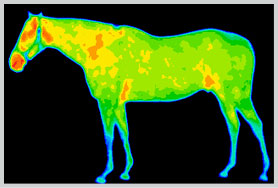
Thermograms are as unique as fingerprints. They are exclusive to each individual and no two will ever be identical. It is important to establish a baseline that indicates what your horse’s normal thermal patterns are so that any subtle changes in successive imaging can be detected immediately.
Any horse involved in competitive sport, whether show jumping, eventing, racing, polo or endurance, is subjected to the rigors and stresses of training. Inevitably, minor injuries occur that may lead to more permanent damage if they are not identified and treated accordingly. Clinical studies have shown that Digital Infrared Thermal Imaging can identify tendon lesions two weeks before they are clinically evident. Early detection before there are clinical symptoms is the key to successfully managing and treating these injuries. Identifying minor problems at an early stage will allow for immediate treatment, as well as changes to training programs and competition schedules.
MONITORING REHABILITATION & RECOVERY
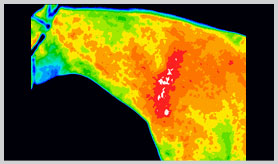
Eliminate the guess work from observing your horse’s road to recovery and minimize the chance of a re-injury by returning to training before your horse has healed. DITI provides accurate information about the horse’s response to the prescribed treatment as well as the effects of the injury. Routine screening throughout rehabilitation and recovery can monitor the healing process and determine when your horse can safely return to work or competition and give you peace of mind!
PRE PURCHASE/PRE SALE EXAM
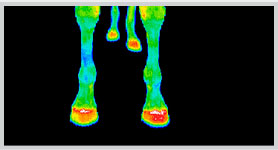
All horse owners, trainers and veterinarians are acutely aware of the importance and necessity of a Pre-Purchase Exam. The long term costs associated with horse ownership often exceed the initial purchase price, regardless of the horse’s intended use. A full body DITI scan as part of a pre-purchase exam will provide accurate information about every area of the horse, including subtle or sub-clinical inflammation, infection, joint dysfunction, musculoskeletal issues, nerve injuries, and injection sites. EquiSpectrum DITI can show potentially problematic issues that would not be detected by the physical exam or radiographs alone. These findings can justify additional diagnostic testing or a re-evaluation for the horse’s suitability to the buyer. Sellers make their horse more marketable with a full EquiSpectrum screening and report.
Included in the Pre-Purchase/Pre Sale Screen :
- Full body scan, including dental & hoof screening
- stress testing
- saddle fit evaluation
- Full Board Certified Veterinary Thermologist report
- EquiSpectrum screening certificate
SADDLE FITTING & BACK ISSUES
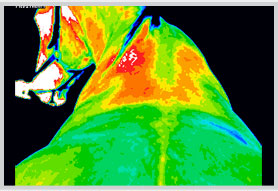
The importance of a properly fitting saddle can not be overstated. The conformation of a horse’s back is in a state of constant flux. Contributing factors are the natural progression of maturity and aging, and muscle development through the impact of training and conditioning. A properly fitted saddle is vital in avoiding back injury and must be adjusted on a regular basis to conform to the horse’s ever changing shape. A DITI screening can evaluate the fit of your saddle, the effects on your horse, and any developing problems that may stem from the saddle, and the subsequent position of the rider. We are more than happy to collaborate with your saddle fitter, or recommend one if needed.
Back soreness itself, is often a secondary issue resulting from a primary abnormality or injury elsewhere in the body. Navicular disease and Degenerative Joint Disease, for example will often force horses to compensate for pain by shifting their body weight away from the painful area. This causes excessive stress along the spine and can result in chronic problems. DITI examination, can identify any other anomalies in the body that may be contributing to the horse’s back discomfort.
